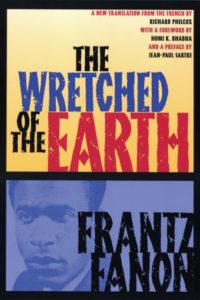 An Analysis of the Psychology of the Colonized
An Analysis of the Psychology of the Colonized
The Wretched of the Earth was originally written by Frantz Fanon in 1961, and explored the psychology of colonized people and their path to liberation. Bearing singular insight into the rage and frustration of colonized peoples, and the role of violence in effecting historical change, the book incisively attacks the twin perils of post-independence colonial politics: the disenfranchisement of the masses by the elites on the one hand, and intertribal and interfaith animosities on the other.
Fanon’s analysis has been a veritable handbook of social reorganization for leaders of emerging nations. A distinguished psychiatrist from Martinique who took part in the Algerian Nationalist Movement, Frantz Fanon was one of the most important theorists of revolutionary struggle, colonialism, and racial difference in history. The Wretched of the Earth has had a major impact on civil rights, anti-colonialism, and black consciousness movements around the world, and this bold new translation by Richard Philcox reaffirms it as a landmark.
Reviews and endorsements of the publication include:
“The writing of Malcolm X or Eldridge Cleaver or Amiri Baraka or the Black Panther leaders reveals how profoundly they have been moved by the thoughts of Frantz Fanon.” —The Boston Globe
“Have the courage to read this book.” —Jean-Paul Sartre
“This century’s most compelling theorist of racism and colonialism.” —Angela Davis
“This is not so much a book as a rock thrown through the window of the West. It is the Communist Manifesto or the Mein Kampf of the anti-colonial revolution, and as such it is highly important for any Western reader who wants to understand the emotional force behind that revolution.” —Time
For more information on the publication, click here.
Fellow travelers are scholars, activists, and practitioners that embody the ideals and commitments of the Project on Lived Theology. We admire their work and are grateful to be walking alongside them in the development and dissemination of Lived Theology.
